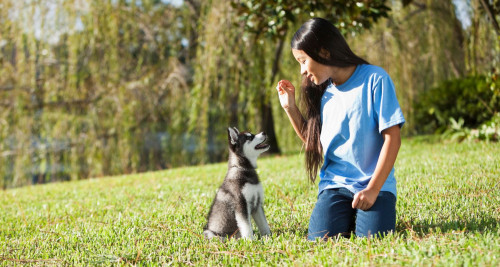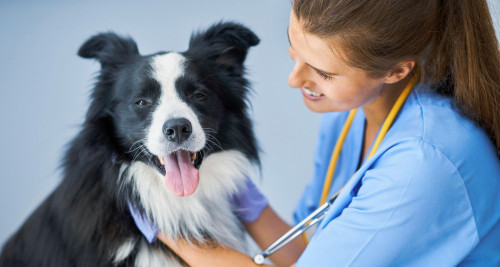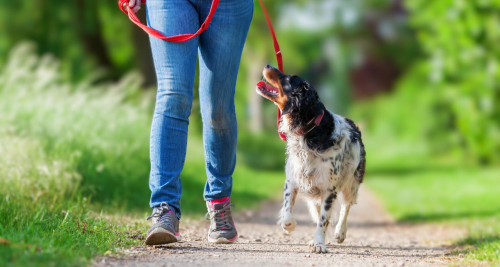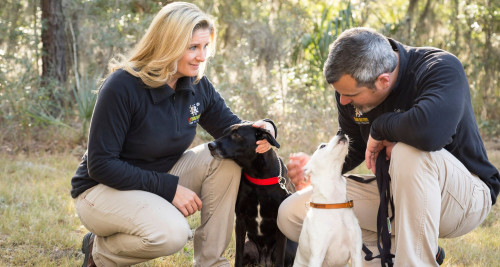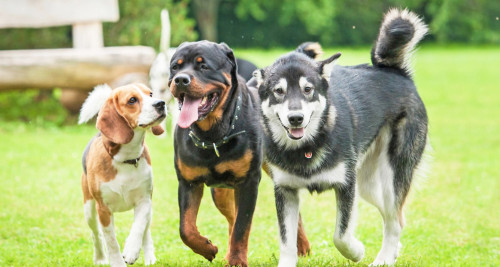The German Shepherd
The German Shepherd is rated as one of the most intelligent of all breeds and continues to be very popular around the world. The German Shepherd has a loyal fan base and continues to trend well amongst dog lovers, the breed ranks high in popularity in the USA, Australia, New Zealand, Canada and the UK.
We believe their popularity is due to their undying loyalty and naturally protective nature, which stems from their heritage as guarders of sheep. They originated as a wolf-like breed that was capable of herding and controlling sheep and a formidable force, capable of fending off wolves in the country and hills of native Germany.
They are very trainable but not the easiest dog to train, due to their determined, strong-willed nature. They won’t comply for just anyone and will need strong, determined leaders. Once trained correctly, they generally stay trained with only small amounts of regular maintenance and consistent rules needed.
Breed Traits and Characteristics
According to the American Kennel Club, here are some breed characteristic you can find in German Shepherds. test
- Height
24-26 inches (male), 22-24 inches (female)
- Weight
65-90 pounds (male), 50-70 pounds (female)
- Life Expectancy
7-10 years
- Coat Type/Length
Double/Medium
-
100 Affectionate with Family
-
100 Good with Young Children
-
60 Good with Other Dogs
-
100 Trainability Level
-
100 Energy Level
-
60 Barking Level
-
80 Shedding Level
-
40 Drooling Level
The German Shepherd
German Shepherds are slow to mature. In some cases, reaching full maturity can take up to 4 years before you see the personality of a mature dog kick in. Meanwhile, you might have to contend with a puppy’s brain, housed in a full grown powerful dog. The wait is worth it!
It is for that reason, we recommend that you practice some good management of your German Shepherd puppy from an early age on to reduce any property damage, while they mature and develop.
Don’t leave your puppy confined for long hours. Not only will they not like it, but they need to have their intellect challenged on a daily basis, so make sure you provide the right kind of entertainment for them. Ideally, they need to be mentally stimulated and busy or they will find something to occupy their brain that could result in the damage of your precious possessions.
German Shepherd Breed Facts
Breed Capabilities
It is the German Shepherd’s inherited attributes that has seen them become the most selected dogs for police work, assistance, therapy, support dogs and scent detection dogs. They are adept at all types of detection work, including drug and bomb detection.
They will master any task you set out for them, but you will need patience and determination to get the best out of them.
The German Shepherd does very well at obedience training and agility work. They love to be kept busy and to have an outlet for their energy and intellect.
Search and Rescue
They have great scenting attributes and are ideal for Search and Rescue work. You can start your German Shepherd puppy off with simple scenting tasks.
Start by hiding food and getting your dog to find it. Then hide their favorite toy and encourage your dog to follow the scent trail.
Energy Levels
The German Shepherd has very high energy levels and can be the type of breed that will charge through the house, jumping on everything and everyone, sweeping knick knacks off the table with their tail as they go.
Their strength is something that their owners complain about and find hard to control
Address some of these energy levels by exercising your dog’s mind and body. Hiding treats around the garden or home can help and providing the right toys and obedience training that stimulate their active mind.
Personality & Temperament
The German Shepherd’s temperament/personality is generally energetic, outgoing and stable.
The breed’s natural wariness of strangers is what makes them the ideal guard dog.
The AKC describes the ideal German Shepherd as having a distinct personality marked by direct and fearless, but not hostile, expression, self-confidence, and a certain aloofness that does not lend itself to immediate and indiscriminate friendships.
They are a highly intelligent breed with a high level of energy that needs lots of activities to keep them entertained, content, and mentally challenged.
The breed’s natural wariness of strangers is what makes them the ideal guard dog; however, they do need to be strictly controlled or they will over-step the mark and someone could get hurt.
The German Shepherd is a powerful dog that needs an owner that has the patience, understanding, and knowledge of how to stay in control of their behavior.
Some are over friendly and others are at the other end of the scale making them wary of strangers or aggressive.
This can be dependent on its breeding; the dog’s bloodlines as well as its upbringing; the type of environment it is raised in, and the education it receives as it grows and develops.
Points of Interest
- Has a very dense undercoat, that needs regular grooming and ongoing care.
- All around versatile dog that adapts to any surroundings.
- Great watch dog, but needs education and training to ensure they are not allowed to take liberties and can control their watchfulness.
- Great family dog, providing they receive early basic canine education and consistent, ongoing management.
- A loyal and loving nature.
- Energetic and athletic – a great companion for the fitness-loving dog owner.
- Fearless personalities, that can be prone to aggression if not educated correctly.
- Staying power and high energy levels.
- Need lots of brain stimulation and interactive toys.
- Big barkers, which stems from their natural protective natures, so stay in control of this.
- Highly intelligent and capable of being trained to do almost anything. They are strong-willed so you might need expert advice and help.
- Natural suspicion of strangers, but will make friends if introduced properly.
The American Kennel Club on the German Shepherd
The first impression of a good German Shepherd dog is that of a strong, agile, well-muscled animal, alert and full of life. It is well balanced, with harmonious development of the forequarter and hindquarter. The dog is longer than tall, deep-bodied, and presents an outline of smooth curves rather than angles. It looks substantial and not spindly, giving the impression, both at rest and in motion, of muscular fitness and nimbleness without any look of clumsiness or soft living. The ideal dog is stamped with a look of quality and nobility - difficult to define, but unmistakable when present. Secondary sex characteristics are strongly marked, and every animal gives a definite impression of masculinity or femininity, according to its sex.
There are many reasons why German Shepherds stand in the front rank of canine royalty, but breed experts say their dogs’ most important attribute is character: loyalty, courage, confidence, the ability to learn and retain commands for an amazing number of specialized jobs, and the willingness to put their life on the line in defense of loved ones. Well-bred German Shepherds of proper training and socialization will be gentle family pets and steadfast guardians eternally devoted to their human flock.
The AKC Standard says the German Shepherd "has a distinct personality marked by direct and fearless, but not hostile, expression, self-confidence, and a certain aloofness that does not lend itself to immediate and indiscriminate friendships. The dog must be approachable, quietly standing its ground and showing confidence and willingness to meet overtures without itself making them.
That's a great description of an ideal German Shepherd.
Unfortunately, it's very difficult to find an ideal German Shepherd today. Nowadays, this breed is all over the map in temperament. Lines that are bred for protection, work, and the sport of schutzhund tend to be "hard-tempered" and businesslike. Show lines personalities range from mild and mellow, to hyperactive and skittish, to downright dumb and dopey. And many German Shepherds bred by backyard breeders have risky temperaments and suffer from a host of health problems.
Energy levels vary from vigorous to laid-back, but all German Shepherds, to maintain their athletic shape, need brisk walking every day and all-out running in a safe, enclosed area as often as possible.
Mental exercise (advanced obedience classes, agility classes, schutzhund, tracking, herding) is even more important for German Shepherds. This is a smart, thinking breed (at least the good ones are!) and his intelligence is often wasted in a home that simply wants a casual pet.
Finally, early and ongoing socialization is a must to develop a stable, confident temperament.
One of the most capable and trainable breeds in all of dogdom, here are some things for you to consider:
Legal liabilities.
German Shepherds may be targeted for "banning" in certain areas, or refusal of homeowner insurance policies. In this day and age, the legal liabilities of owning any breed that looks intimidating and has a history as a guard dog should be considered. People are quicker to sue if such a dog does anything even remotely questionable.
The wide range of temperaments.
German Shepherds are so very different from each other, and different breeders produce very different temperaments. If you want a family companion, you do not want high-energy working lines, and if you want a dog for protection work, you do not want show lines. With German Shepherds more than any other breeds, you must carefully research your lines or you will end up with a dog who isn't at all what you were looking for. Unfortunately, many German Shepherds are badly bred by unknowledgeable people. The result is that obedience instructors and behavioral consultants see lots of German Shepherds with neurotic behaviors, especially aggression, skittishness, and extreme fearfulness. Again, you need to carefully research your lines.
Most German Shepherds have protective instincts toward strangers. They need extensive exposure to friendly people so they learn to recognize the normal behaviors of "good guys." Then they can recognize the difference when someone really does act abnormally.
Potential animal aggression.
Most German Shepherds, when introduced at a young age, are very good with other dogs and cats in their own family. But many German Shepherds are dominant toward other dogs of the same sex, which can result in aggression if the other dog feels the same way. Some German Shepherds develop predatory behavior toward cats.
Heavy shedding.
German Shepherds shed only once a year – for 365 days. In other words, they shed constantly. You'll find hair all over your clothing, furniture, and carpeting. Frequent vacuuming will become a way of life. Make sure you're really up for this. Most people have no idea how much hair these dogs can produce. I know – I've lived with them
Finding a healthy one and keeping him healthy.
From hip and elbow dysplasia to heart disease and cancer, to stomach disorders and skin diseases, German Shepherds are, unfortunately, one of the riskiest breeds in terms of long-term health. The list of serious health problems to which they are susceptible is dismayingly long. Once you have your puppy home, you need to keep him healthy, starting with feeding the best food.
Providing enough mental stimulation.
German Shepherds are so intelligent and capable. I hate to see them chosen by owners who just want a dog to hang around the house and yard (instead see our section on Labradors). German Shepherds thrive when you find interesting things for them to do that challenge their minds. Bored German Shepherds, especially when young, can become rambunctious and destructive.
German Shepherd Common Behavioral Issues
German Shepherds have their fair share of behavioral issues, things such as barking, aggression towards strangers and over-protectiveness of home and family, which can stem from their natural suspicion of strangers.
Pulling on a Leash
Pulling on the leash ranks quite high in their list of behavioral and training issues as they have this innate need to always walk ahead of their owners, regardless of how much they are corrected.
Getting your German Shepherd to walk correctly on the leash, by your side, needs expertise and the right walking technique or you could struggle to control such a powerful dog.
Other issues can be things like ‘dog aggression’ which in some cases, can take time and effort to effectively solve this behavior satisfactorily.
Chewing or Over-exuberance
Chewing or over-exuberance are usually more prevalent in German Shepherd puppies. Like all breeds, they need entertainment to satisfy their intelligence levels, as well as exercise and education. Don’t take on a German Shepherd dog/puppy unless you have the time to devote to them and the energy levels that they deserve.
German Shepherds will generally attach themselves to one person in the family, but they can still be a good family dog.
Although they have their fair share of behavioral issues, these generally stem from a lack of leadership on the part of their pet parents. They are very trainable but they do have strong personalities that need the right type of pet parent and the right type of training that is just and fair. Then you will see how wonderful they can be.
They are definitely worth the effort if you can stay the course and they will repay you tenfold. If you can just spend time educating and training, you will reap the benefits in the long run.
Connect with Us!
Need help training your German Shepherd? Call 1-877-500-BARK (2275)or enter your zip code.
Sibling Rivalry with German Shepherds: A Case Study
Adding Another Dog to Your Family
If you already have a dog and want to add another, there are some things to consider before doing so.
If possible, match the size of the dogs and look to add the opposite sex. Female dogs traditionally ‘rule the roost’ and adding a neutered male will cause few issues. Adding a neutered male to the family when you already have a similarly-sized neutered male will normally go off without a hitch, providing you treat them equally.
However, matching two females is a good bit harder and we do encounter many situations where we are asked to treat what is commonly referred to as “Sibling Rivalry’’ even if they are not true siblings.
If you encounter such a situation, separate the dogs and call us. Bark Busters is always here to help.
Sibling Rivalry Case Study
Bess a 12-month old German Shepherd was the apple of her owner’s eyes, whom we will refer to as John and Shirley.
John and Shirley had nursed Bess through a serious illness over many months. They felt that she was a special dog and believed that she was such a gentle soul that would never harm a fly.
One day while John and Shirley were out visiting a friend who worked at a rescue shelter, they spotted an adorable female Bull Terrier puppy named Snowflake. It was an instant attraction and they both fell in love with this cute, white wriggly creature. They just knew in their hearts that Bess would love her too. They felt that she would be a great friend for Bess who John and Shirley felt spent too much time alone while they had to work.
They signed the papers and immediately adopted Snowflake.
Things appeared to be okay in the beginning and both Bess and Snowflake seemed to get along. Bess would tolerate Snowflake jumping on her and biting her face and tail. At night, Snowflake loved to be wherever Bess was and would always curl up nearby or climb into bed near her when she settled down for the night.
Things continued like this for months until one day when Snowflake was about eight- months-old and the two dogs got into a fight. John and Shirley were shocked because they had to drag them apart. Thinking this was just a minor disagreement, they immediately put them together again but to their dismay the same thing occurred.
Soon the two dogs seemed to hate the mere sight of each other and John and Shirley had to have them living in separate parts of the home, each in their own room. This was an impossible situation with dogs and humans on edge all the time.
Bess was still the love of their life and they still held a special place in their heart for her and if anyone had to leave they knew in their hearts it had to be Snowflake. They were conflicted because they had adopted ‘Snowflake’ in good faith. Over time, they were wishing they had never brought her home.
The Reality of the Case
The reality was that this was a miss-match from the start. John and Shirley had made a common mistake of not seeking professional advice before choosing another dog and in believing that if they loved a dog that their other dog would too.
Female dogs generally rule the roost in most households. In our research, we have discovered that if there is an issue with Sibling Rivalry or dog fights in the home, it will usually be the female dog that instigates them in some way.
We advised John and Shirley that this was not going to be an easy fix and we needed their dedication to make it work. They were adamant they wanted to try.
The matching of two or more female dogs can work, but more times than not, it doesn’t and fights and battles to be the “Top Dog” continue to occur.
The better situation would have been to match a neutered male with a spayed female of equal size and energy. However, Shirley and John were determined to making it work by following our training advice to see if they could rectify this issue.
There was also another issue that we uncovered during our training in the Bess and Snowflake case -- it was John and Shirley’s deep affection and sympathy for Bess who had been sick and ailing for a long time. This caused them to deal with her differently. They tended to be firmer with Snowflake than they were with Bess, which had caused an imbalance in the relationship. Therein was one of the root causes of many of the fights.
Once we were able to have John and Shirley put in place some ‘canine communication’ and instilled in them the importance of treating both dogs equally, the fighting stopped and dogs and humans were able to live together again.
Footnote:
The main causes of sibling rivalry (dog fighting with other dogs in the household) is where owners treat dogs differently, where they have a favorite or where one dog has been sick or injured. Once we point that out and people change their approach and then put in place some canine communication, we can usually rectify the problem. It takes dedication and commitment from the dog parents.
German Shepherd Health
Common Illnesses and Injuries
Your German Shepherd’s health concerns will change over the course of their life. A puppy might be more prone to ear infections as their immune system develops, a 2-year-old GSD may be more likely to show signs of hip dysplasia, and a senior German Shepherd is far more likely to develop arthritis or cancer as they age. German Shepherds also have personality and physical traits that may make them more prone to certain conditions—a German Shepherd with hind limbs that are low to the ground may develop more joint issues than the average dog.
At any stage of life, there are some of the most common injuries and illnesses you should be aware of when bringing home a German Shepherd:
- Allergies
- Vomiting and Diarrhoea
- Joint Problems
- Cruciate Ruptures
- Ear Infections.
- Masses
If you are ever concerned about your dog’s health, your local veterinarian is a great resource—no matter how small the question.
Genetic Health Concerns
Like many popular breeds, the German Shepherd has its fair share of hereditary based issues, like hip dysplasia and degenerative myelopathy. Most reputable breeders now have their breeding stock checked and scored for these hereditary ailments by a veterinarian. You can request proof that the puppy you are purchasing comes from parents that have been checked for these issues.
No dog with identified genetic faults should ever be used for breeding purposes or you will just pass on genetic faults to their offspring.
Because many other health issues are also hereditary, you should do some research on the ancestry of your puppy and any health issues of that particular breed.
Other German Shepherd health issues to watch out for:
- Hip dysplasia and elbow problems
- Degenerative Myelopathy
- Von Wilderbrand disease --a bleeding disorder
- Exocrine pancreatic insufficiency that requires a pancreatic supplement that has to be given with food-speak to your vet for more details
- Retinal dysplasia
Some of these ailments may not be hereditary but could stem from environmental or dietary issues. Be sure that your dog is fed on a healthy diet and receives regular vet checks to ensure it always stays healthy.
These are heredity ailments and you can learn more about these by speaking with your veterinarian. It is always wise to ensure your German Shepherd has regular veterinary checkups throughout its life and that you seek their advice on any medical issues.
Tips for Every Dog Owner
Hear from Bark Busters Clients Who Have a German Shepherd
Need Dog Training Assistance with Your German Shepherd? Find Your Local Trainer Now!
CALL TODAY 1-877-500-BARK (2275)
